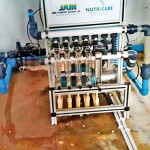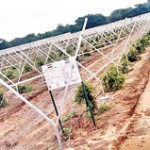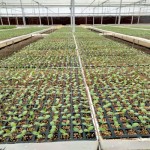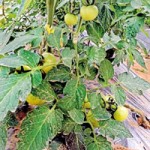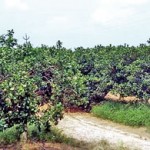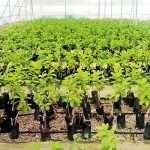News
Ground being prepped to set up Israeli agri-tech centre
View(s):By Kasun Warakapitiya
Israel is trying to finalise an agreement with Sri Lanka to have a center of excellence to transfer its agricultural technology to Sri Lanka.
The project aims to improve cooperation and strengthen relations with Sri Lanka by transferring knowledge to Sri Lankan farmers to increase their production by introducing micro-irrigation, drip irrigation, and cultivation techniques to conserve water and use a precise amount of liquid fertiliser to reduce costs and labour while enhancing productivity.
During the visit, Israeli Ambassador Naor Gilon, accredited to both India and Sri Lanka, briefed on the plans to set up a centre in Sri Lanka and provide technology from Government to Government on a nonprofit basis.
- A water pump mixes fertliser into drip irrigation
- Pruning done to provide more sunlight
- Seedling nursery
- Mulching is done to stop weeds from growing underneath the plants
- Flat and raised bed citrus cultivation
- Drip irigated guava plants in a climate-controlled greenhouse
He said Israel would like to start the first centre in Sri Lanka within a year, once a consensus is reached with the Sri Lankan Government.
He said that if Sri Lanka decides where to set up the centre and what aspect of Israel’s expertise is needed, Israel would proceed.
Mr. Gilon said they have many things to offer as they have expertise and technology in many fields such as horticulture, fruit, date palm, and citrus cultivation, as well as advanced technology on honey production and dairy farms.
“Sri Lanka can decide on the field of expertise, and we would provide the knowledge and technology by setting up a centre of excellence. After ensuring the success of the centre, we would like to diversify the fields geographically,’’ he said.
He explained that they are ready to have bilateral or trilateral relationships with Sri Lanka when setting up centres of excellence and added that they are looking for financial cooperation through India due to Sri Lanka’s economic situation. Mr. Gilon said there are also other channels where the centre can be set up directly between Sri Lanka and Israel if Sri Lanka has resources, obtains financial cooperation from India, or obtains funds from international organisations.
He said the last discussion was held when Foreign Minister of Israel visited the Israeli embassy in India in May, 2023.. They tried to conclude discussions and finalise an agreement, but it did not work out as planned as the visit was cut short.
The Israeli embassy in India claimed that the agreements are currently floating with three irrelevant ministries, such as agriculture, and the foreign ministry, while drafts are with professionals. Meanwhile, India also expressed readiness to put in the money and is working towards implementation.
During the visit to the centre on July 27, the Sunday Times was shown how citrus fruits, pomegranate, guava, date palm, olive, and dragon fruit are cultivated by using drip and micro-irrigation systems.
The centre also houses mature plants and seedlings in protective structures and carries out grafting, and the production of vegetable seedlings in a soilless medium in hi-tech greenhouses.
Greenhouses, insect-proof net houses, and shade net houses equipped with disinfection measures set up at entrances are set up to provide greater care to both parent plants, propagated seedlings, and plants grafted with higher-yielding plant varieties.
There are also three water storage tanks with an automated pump system to pump water mixed with liquid fertilisers stored in covered containers to the pipe system that provides water to plant nurseries in protective structures as well as orchards via micro and drip irrigation methods.
A specialist who had been looking after the pomegranate crop for a decade at the centre, Dr. Ramesh Kumar, said correspondence with Israelis began in 2006 and the Indo-Israeli project began in 2009.
“This was the first project in India based on Israeli technology. The technology is helpful as there is water scarcity as well as a lack of quality water for the production of fruit crops. We use the technology to minimise wastage and use exact amounts of water to increase production,” he said.
“The main crop of the centre is citrus. We have 25 main varieties of citrus in a 13-acre orchard area. Out of them, 11 varieties are imported from Israel: seven varieties of mandarin and four varieties of orange.’’
He said there are six acres of pomegranate, two acres of date palm, three acres of guava, six acres of olive, three acres of bael, one acre of grape, 0.5 acres of dragon fruit, and three acres of plum, pear, peach, and fig in their orchards.
He said that they use ridge and flat methods to plant citrus, pomegranate, and olive trees, while vertical trial methods, rootstock trial methods, and micro-irrigation with automation are used in orchards and plant nurseries.
Vegetable seedling production in soil-less media in high-tech greenhouses, development of mother plants, and carrying out grafting and propagation in protected structures were some of the major activities done at the centre.
Apart from that, the centre trains farmers through demonstrations and by providing quality seedlings. From 2011 to 2022, 641,088 fruit plants were grafted and 15,633,099 seedlings were propagated.
The Sunday Times went on a guided tour to the centre of excellence in semi-arid horticulture in Gignow, some 150 kilometres from New Delhi. Completed on January 22, 2023, it aims to generate knowledge, demonstrate best practices, and provide knowledge to farmers by training experts, having webinars, training programmes, and residential workshops.
(The Sunday Times was part of a group of journalists from Sri Lanka shown around Indo Israel Center of Excellence for fruit in the village Mangiana, in Haryana and Indo Israel Center of Excellence for Semi-arid Horticulture in Gignow village in Haryana in India arranged by the israeli embassy in
New Delhi).
The best way to say that you found the home of your dreams is by finding it on Hitad.lk. We have listings for apartments for sale or rent in Sri Lanka, no matter what locale you're looking for! Whether you live in Colombo, Galle, Kandy, Matara, Jaffna and more - we've got them all!


